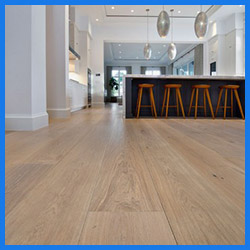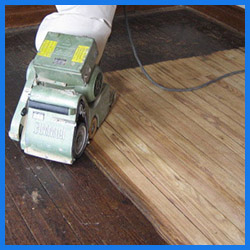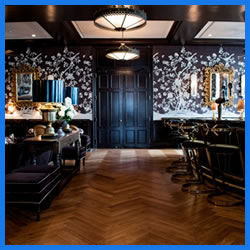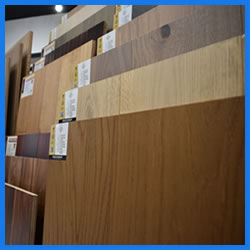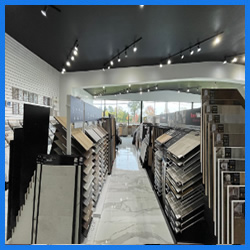Blog
Summer Energy Efficiency: How Flooring Can Help Keep Your Home Cool

As summer approaches, the battle against the heat begins. Cranking up the AC might seem like the only solution, but did you know your flooring can play a significant role in keeping your home cool and reducing energy consumption? Here's how:
Understanding Heat Transfer:
Heat transfer happens in three ways: conduction, convection, and radiation.
● Conduction: Heat flows from a warm object to a cool one when they touch. This is why bare feet feel cold on tile floors.● Convection: Warm air rises, while cool air sinks. Traditional air conditioners work by removing warm air and replacing it with cool air.
● Radiation: Surfaces absorb and emit heat. Darker colors tend to absorb more heat, while lighter colors reflect it.
Flooring and Heat Control:
Now, let's see how flooring choices can impact your home's temperature:
● Light-colored Tiles and Stone: These materials are naturally cool conductors. They absorb less heat from the sun's rays and feel cool underfoot. This reduces reliance on air conditioning for overall comfort.● Light-colored Laminates: Look for laminates with a light-reflective finish. These reflect sunlight away from the floor, preventing it from heating up the room.
● Engineered Hardwood: Similar to light-colored laminates, engineered hardwood with a light finish reflects heat, contributing to a cooler feel.
Beyond Color: Additional Considerations
● Material Properties: Natural materials like stone and tile are generally cooler than carpets. Carpets absorb and trap heat, making rooms feel warmer.● Underlayment: Using an insulating underlayment beneath laminate or engineered hardwood can improve thermal resistance, keeping cool air from escaping through the floor.
● Sun Exposure: Minimize direct sunlight entering rooms with heat-conductive floors. Consider curtains or blinds to block harsh rays.
Benefits of Cooler Flooring:
By choosing heat-reflective or conductive flooring, you can enjoy these advantages:
● Reduced Energy Consumption: Less reliance on air conditioning translates to lower energy bills.● Improved Comfort: A cooler home environment naturally feels more comfortable, especially during hot summer months.
● Sustainable Choice: Lower energy consumption benefits the environment by reducing your carbon footprint.
Remember:
Flooring is just one piece of the puzzle. Combining these tips with other summer cooling strategies like ceiling fans and proper ventilation can significantly improve your home's energy efficiency and keep you cool all summer long. So, next time you're considering a flooring upgrade, factor in its impact on your home's temperature and embrace a cooler, more sustainable summer!
Hardwood vs. Bamboo: A Sustainable Showdown
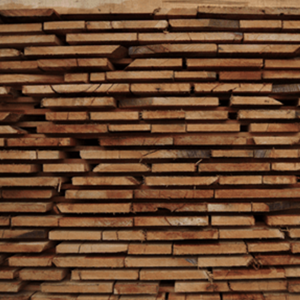
Choosing sustainable materials for your home can be tricky. When it comes to flooring and panels, two popular options are hardwood and bamboo. But which is truly the more sustainable choice? This blog dives deep into the environmental impact of both materials, across various factors, to help you make an informed decision.
Growth and Maturity:
● Hardwood: Reaches maturity in 40-50 years, with responsible forestry practices showing significant growth (USDA Forest Service reports a 131% increase in hardwood trees since 1953).● Bamboo: Matures quickly in just 5-7 years, but only specific species are suitable for building materials, and immature plants lack necessary hardness.
Energy Consumption:
● Hardwood: Requires minimal energy, mainly for sawing.● Bamboo: Requires significant energy for processing and compressing its strips with adhesives, impacting its sustainability claims.
Chemical Usage:
● Hardwood: Generally uses no harsh chemicals. ● Bamboo: Often relies on formaldehyde-based adhesives, which can off-gasharmful substances in lower-grade products.
Material Utilization:
● Hardwood: Responsible forestry practices ensure most of the log is used, with byproducts like bark and sawdust finding new purposes. Finished products can be repurposed or used as fuel.● Bamboo: Manufacturing often wastes 35% of the raw material, with traditional methods reaching 65% waste.
Quality Standards:
● Hardwood: Established regulations ensure consistent quality in the US.● Bamboo: Lacks consistent quality control, especially with products originating outside the US.
Carbon Footprint:
● Hardwood: Responsibly managed forests act as "carbon sinks," storing carbon long-term and offsetting emissions.● Bamboo: Though the plant itself stores carbon, the energy-intensive processing and long-distance shipping negate its carbon-neutral claims.
Shipping:
● Hardwood: Can be sourced and shipped regionally, minimizing transportation emissions.● Bamboo: Often travels long distances from Southeast Asia, adding significantly to its carbon footprint.
Aesthetics:
● Hardwood: Offers a wide variety of species, colors, and grains to suit diverse design needs.● Bamboo: Generally limited to light, honey, or natural tones, with vertical or flat-grain patterns.
Lifespan and End-of-Life:
● Hardwood: Solid hardwood floors can last over 125 years with refinishing, and even scraps can be repurposed or used as fuel. When discarded, they decompose naturally.● Bamboo: Typically lasts 30-50 years, and due to high glue content, may not decompose readily in landfills.
Conclusion:
While both hardwood and bamboo have their advantages, hardwood emerges as the more sustainable option in most aspects. Its slower growth is counterbalanced by responsible forestry practices and minimal processing, leading to a lower overall environmental impact. This blog encourages you to consider these factors when choosing sustainable materials for your next home renovation project.
Breathe New Life into Your Floors with Expert Sanding and Refinishing
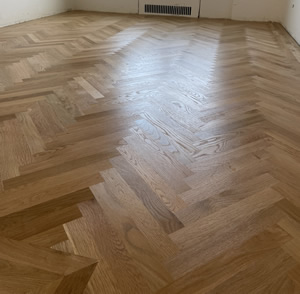
Is your hardwood floor looking dull, scratched, or just plain tired? Does it need a refresh to recapture its original beauty? Professional sanding and refinishing services can give your floors a new lease on life and transform the look of your entire home.
At South Jersey Hardwood, we offer a wide range of sanding and refinishing services to cater to your specific needs and budget. We are experts in handling both solid hardwood and engineered hardwood floors, ensuring a smooth and flawless finish that will last for years to come.
Here's what we offer:
Sanding and Refinishing:
● We remove the old, worn-out finish, revealing the natural beauty of the wood underneath.● We address any imperfections, scratches, or unevenness to achieve a perfectly smooth surface.
● We apply a brand-new finish that protects the wood and enhances its natural grain.
Screen-and-Coat:
● This is a less invasive option for floors in good condition that only require a light refresh.● We buff the surface to remove minor scratches and dullness, leaving your floors looking revitalized.
● We apply a fresh coat of finish for added protection and shine.
Commercial and Residential Services:
We are equipped to handle projects of all sizes, from small apartments to large commercial spaces.
Stain Selection Assistance:
Choosing the right stain can be overwhelming. Our experts can help you select the perfect stain to complement your existing décor and create the desired ambiance.Experience and Quality:
Our team of highly trained and experienced professionals uses only the highest-quality materials to ensure your floors look stunning and last for years to come.

